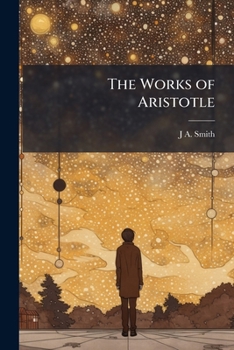The Works of Aristotle
This comprehensive collection, "The Works of Aristotle," presents the foundational writings of one of history's most influential thinkers. Compiled and translated to make Aristotle's profound insights accessible to a modern audience, this volume covers a vast range of subjects, reflecting the breadth and depth of his intellectual pursuits.
Readers will find key texts exploring logic, metaphysics, ethics, politics, and natural science. Aristotle's systematic approach to knowledge and his emphasis on empirical observation laid the groundwork for Western philosophy and scientific inquiry. His works continue to be studied and debated, offering invaluable perspectives on fundamental questions about the nature of reality, human existence, and the ideal state.
This edition, carefully curated, provides a valuable resource for scholars, students, and anyone interested in engaging with the enduring legacy of Aristotelian thought. Discover the timeless wisdom and intellectual rigor that have shaped centuries of philosophical and scientific discourse.
This work has been selected by scholars as being culturally important, and is part of the knowledge base of civilization as we know it. This work was reproduced from the original artifact, and remains as true to the original work as possible. Therefore, you will see the original copyright references, library stamps (as most of these works have been housed in our most important libraries around the world), and other notations in the work.
This work is in the public domain in the United States of America, and possibly other nations. Within the United States, you may freely copy and distribute this work, as no entity (individual or corporate) has a copyright on the body of the work.
As a reproduction of a historical artifact, this work may contain missing or blurred pages, poor pictures, errant marks, etc. Scholars believe, and we concur, that this work is important enough to be preserved, reproduced, and made generally available to the public. We appreciate your support of the preservation process, and thank you for being an important part of keeping this knowledge alive and relevant.
Related Subjects
History Philosophy Science Science & Math Science & Scientists Science & Technology




